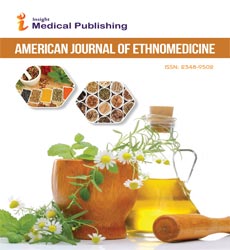ISSN : 2348-9502
American Journal of Ethnomedicine
A Traditional Herbal Remedy for Cancer
Michel Dashbazar*
Department of General Biochemistry, Physiology and Pharmacology, School of Veterinary Medicine, Razi University, Kermanshah, Iran
- *Corresponding Author:
- Michel Dashbazar
Department of General Biochemistry, Physiology and Pharmacology, School of Veterinary Medicine, Razi University, Kermanshah, Iran
E-mail: Micheldashbazar@gmail.com
Received Date: October 05, 2021; Accepted Date: October 12, 2021; Published Date: October26, 2021
Citation: Dashbazar M (2021) A Traditional Herbal Remedy for Cancer Am J Ethnomed Vol.8 No.9:e001.
Editorial Note
Cancer is one of the most feared diseases of the 20th century and continues to spread and increase in incidence in the 21st century. It is an opponent of modernization and is considered to be an advanced pattern of socio-cultural life dominated by Western medicine. Interdisciplinary scientific research is doing its best to combat this disease, but safe and perfect treatments have not yet been introduced into medicine around the world. Recently, research on complementary and alternative medicine related to cancer treatment has become more important. Several studies have been conducted on herbs for a variety of ethnobotany reasons. Ayurveda, a traditional herbal remedy, has proven its value very early on with the use of these natural remedies and the prevention or control of different tumors with different treatments.
Traditional Treatment Methods
According to Ayurvedic principles, the disease cannot be named alone because it varies from person to person in terms of illness, clinical appearance, and the treatment required. The etiology of Ayurveda is explained using Tridosha. Agni or pita, which is present in all cells, is involved in the digestion and metabolism of the human body. Agni depletion is inversely proportional to the corresponding tissue, so in Albuda, tissue overgrowth occurs as the condition of Datwagni (disability) diminishes. Vata can correlate with the assimilation stage, while Kapa correlates with the catabolic stage. Cancer is caused by a metabolic crisis. Strengthening the Vata army and suppressing the Kapa army. Both interact to cause proliferation. However, abnormal cancer growth in certain organs (Ekadesavriddhi) is supplemented by other parts of the body (Anyasthaniyakshaya), such as weight loss (cachexia). Sushruta suggests six stages of the etiology of all diseases, but his concept fits more into the etiology of the tumor than the etiology itself.
Ayurvedic herbs, which are widely used and whose anticancer properties have been scientifically proven. That also offers a wide list of Ayurvedic herbs with anti-cancer properties. Some of these herbs have been shown to increase the therapeutic effect and reduce toxicity of anticancer drugs used in chemotherapy. Some of them also have a radiation sensitizing effect. Pharmacological details of Ayurvedic herbs, including comments on therapeutic doses, side effects, safety and herbaldrug interactions.
Ayurvedic cancer treatment which include the worldwide lifestyle recommendations and the use of certain foods and herbs that not only help prevent the progression of the disease, but also make the patient more comfortable and comfortable in overcoming the symptoms. Allium sativum (garlic) can relieve pain. Bacopa monniera strengthens psychic abilities and helps with stress-related insomnia or insomnia. Herbal combinations of Withania sominifera, Asparagus racemosa, Hydrocotyle asiatica, Nardostachys jatamamsi, Elettaria cardamomum, Tribulus terrestris, Zingiber officinalis and Eclipta alba may also help treat anxiety, tension and insomnia. Ocimum sanctum is beneficial for cancer stress and depression. Curcuma longa, Zingiber officinale, Glycyrrhiza glabra, Terminalia chebula, Occimum sanctum, Adhatoda vasica are used to combat cough and shortness of breath, especially in lung cancer patients. Ayurvedic therapy rejuvenates the body's tissues, tightens the system, and acts as a tonic for the body against cancer cachexia. This focus on overall healing and health promotion makes Ayurvedic therapeutic approaches to cancer treatment promising.
The clinical efficacy and toxicity levels of many anticancer drugs are unknown and uncertain. For example, most Ayurvedic research is in the preclinical stage or is not actively pursued. Future research on this topic will help identify safe and effective anticancer drugs and investigate their mechanism of action. Ayurvedic practitioners and medical researchers can help improve this drug by increasing their commitment and contribution. Case studies are study designs that can lay the groundwork for future research directions and make a valuable contribution to the medical field with minimal cost budget. The National Center for Complementary and Alternative Medicine determines whether complementary and alternative medicine has potential efficacy for certain types of cancer and whether clinical development of treatment needs to continue. We also propose case studies to do. Ignoring Ayurvedic medicines or treating them as unconventional in a regular clinic is no longer an option. The challenge for this drug is to proceed with caution, using both discussion and wisdom.
Open Access Journals
- Aquaculture & Veterinary Science
- Chemistry & Chemical Sciences
- Clinical Sciences
- Engineering
- General Science
- Genetics & Molecular Biology
- Health Care & Nursing
- Immunology & Microbiology
- Materials Science
- Mathematics & Physics
- Medical Sciences
- Neurology & Psychiatry
- Oncology & Cancer Science
- Pharmaceutical Sciences
